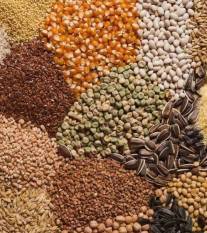NEW DELHI, 23 February 2024 : strong>NEW DELHI, 23 Febraury 2024: As India's population continues to surge, ensuring food security and promoting sustainable agricultural practices becomes increasingly crucial. In this context, multi-grain farming, the cultivation of multiple cereal and legume crops on the same land in a single season or in succession, emerges as a promising approach.
This article delves into the potential of multi-grain farming in India, exploring its opportunities, challenges, and future outlook through 2030.
Opportunities in Multi-Grain Farming
- Enhanced Nutritional Benefits: Multi-grain farming promotes dietary diversification by providing a wider range of essential nutrients. Different grains offer varying combinations of vitamins, minerals, proteins, and fiber, contributing to a more balanced and nutritious diet for consumers.
- Improved Soil Health and Fertility: Rotating crops through multi-grain farming helps break pest and disease cycles, reducing reliance on chemical inputs and promoting soil health. Legumes in the mix fix atmospheric nitrogen, enriching the soil and enhancing its fertility for subsequent crops.
- Increased Land Use Efficiency and Productivity: Multi-grain farming allows for more efficient utilization of land resources. By strategically selecting and planting compatible crops, farmers can maximize their yield potential from a single piece of land, contributing to increased overall agricultural productivity.
- Reduced Risk and Improved Resilience: Diversifying crops mitigates the risks associated with monoculture farming, where dependence on a single crop makes farmers vulnerable to adverse weather conditions, pests, and market fluctuations. Multi-grain farming offers a buffer against these uncertainties, promoting greater resilience for farmers.
- Enhanced Economic Returns: By cultivating a wider variety of crops, farmers can cater to diverse market demands and potentially fetch higher prices for niche or specialty grains. Additionally, multi-grain farming can lead to increased overall yield, contributing to improved income and livelihood security for farmers.
Challenges and Considerations
-
Knowledge Gap and Skill Development: Implementing multi-grain farming effectively requires knowledge of appropriate crop selection, planting techniques, and integrated pest management practices. Bridging the knowledge gap through farmer training programs and extension services is crucial for successful adoption.
-
Market Access and Price Fluctuations: Establishing reliable market linkages for diverse grains produced through multi-cropping remains a challenge. Addressing logistical issues, exploring direct marketing channels, and promoting consumer awareness can help ensure fair prices for farmers.
-
Infrastructure and Storage Needs: Efficient storage and processing facilities are essential for minimizing post-harvest losses and maintaining the quality of diverse grains. Investing in infrastructure development and establishing robust storage and processing systems are crucial for long-term sustainability.
- Government Support and Policy Framework: Supportive policies that incentivize multi-grain farming, promote research and development in this area, and facilitate access to credit and other resources can significantly encourage its adoption by farmers.
Outlook for 2030
Looking ahead to 2030, the Indian agricultural landscape is expected to witness:
- Growing Awareness and Adoption: As the understanding of the benefits of multi-grain farming increases, its adoption is projected to rise across various regions in India. Government initiatives and farmer awareness programs can play a key role in accelerating this trend.
- Integration of Technology: Technological advancements like precision farming, data analytics, and weather forecasting tools can provide valuable insights for optimizing crop selection, planting strategies, and resource management in multi-grain farming systems.
- Focus on Value Addition and Niche Markets: Processing and value addition of diverse grains can unlock new market opportunities and enhance their economic viability. Exploring niche markets for specialty grains with unique nutritional or functional properties can further increase their profitability.
- Emphasis on Sustainability: Sustainable practices like organic farming principles, integrated pest management, and water conservation methods will likely gain prominence within multi-grain farming systems, contributing to environmental protection and resource conservation.
Conclusion
Multi-grain farming presents a promising avenue for addressing the challenges of food security, nutritional deficiencies, and environmental sustainability in India. By overcoming existing challenges, embracing technological advancements, and fostering supportive policies, stakeholders can contribute to the widespread adoption and success of this diverse and resilient farming approach. As India strives towards a sustainable and food-secure future, multi-grain farming holds immense potential to shape a more secure and diverse agricultural landscape by 2030.























